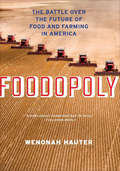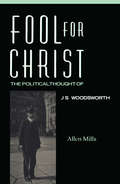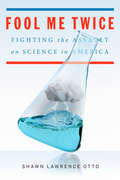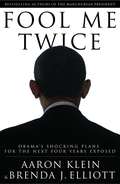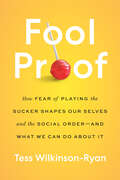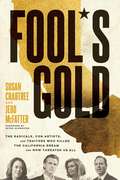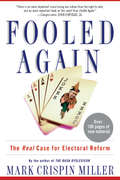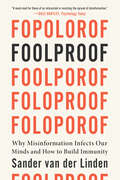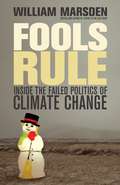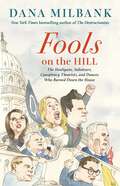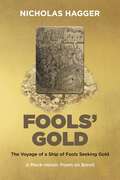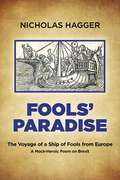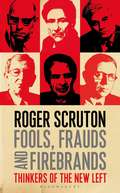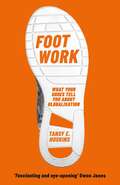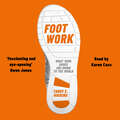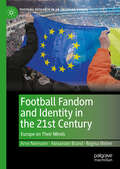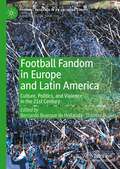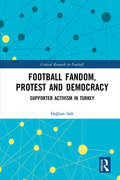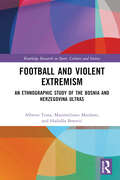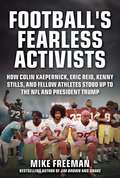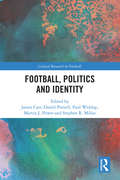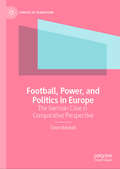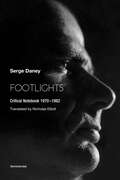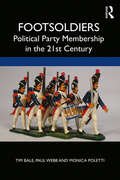- Table View
- List View
Foodopoly: The Battle Over the Future of Food and Farming in America
by Wenonah Hauter&“A meticulously researched tour de force&” on politics, big agriculture, and the need to go beyond farmers&’ markets to find fixes (Publishers Weekly). Wenonah Hauter owns an organic family farm that provides healthy vegetables to hundreds of families as part of the Community Supported Agriculture (CSA) movement. Yet, as a leading healthy-food advocate, Hauter believes that the local food movement is not enough to solve America&’s food crisis and the public health debacle it has created. In Foodopoly, she takes aim at the real culprit: the control of food production by a handful of large corporations—backed by political clout—that prevents farmers from raising healthy crops and limits the choices people can make in the grocery store. Blending history, reporting, and a deep understanding of farming and food production, Foodopoly is a shocking, revealing account of the business behind the meat, vegetables, grains, and milk most Americans eat every day, including some of our favorite and most respected organic and health-conscious brands. Hauter also pulls the curtain back from the little-understood but vital realm of agricultural policy, showing how it has been hijacked by lobbyists, driving out independent farmers and food processors in favor of the likes of Cargill, Tyson, Kraft, and ConAgra. Foodopoly shows how the impacts ripple far and wide, from economic stagnation in rural communities to famines overseas, and argues that solving this crisis will require a complete structural shift—a change that is about politics, not just personal choice.
Fool For Christ
by Allen MillsJames Shaver Woodsworth (1874-1942) stands as one of the half-dozen most important national political figures in twentieth-century Canadian history. Allen Mills acknowledges his outstanding achievements while providing a critical account of the Woodsworth legacy and revising the received opinion of him as a man of unbending conviction and ever-coherent principle.A product of western Canada's pioneer society and a stern Methodist household, Woodsworth grew up to make his way into social service and politcal action. A member of parliament for over twenty years, he rejected the traditional forms of political activity, seeking a new politics and a new political party. The latter turned out to be the Co-operative Commonwealth Federation founded in 1932. Its first leader was Woodsworth himself.In a crucial period between the World Wars, Woodsworth helped define the character of the modern Canadian, non-Marxist Left and of many of Canada's important economic and social institutions. Among them are the welfare state, the Bank of Canada, and Canada's internationalist role in the contemporary world. Disclaimer: Quotes by T.S. Eliot, F.R. Scott, and Louis MacNeice removed at the request of the rights holder.
Fool Me Twice: Fighting the Assault on Science in America
by Shawn Lawrence Otto"Whenever the people are well informed," Thomas Jefferson wrote, "they can be trusted with their own government."But what happens in a world dominated by complex science? Are the people still well-enough informed to be trusted with their own government? And with less than 2 percent of Congress with any professional background in science, how can our government be trusted to lead us in the right direction?Will the media save us? Don't count on it. In early 2008, of the 2,975 questions asked the candidates for president just six mentioned the words "global warming" or "climate change," the greatest policy challenge facing America. To put that in perspective, three questions mentioned UFOs.Today the world's major unsolved challenges all revolve around science. By the 2012 election cycle, at a time when science is influencing every aspect of modern life, antiscience views from climate-change denial to creationism to vaccine refusal have become mainstream.Faced with the daunting challenges of an environment under siege, an exploding population, a falling economy and an education system slipping behind, our elected leaders are hard at work ... passing resolutions that say climate change is not real and astrology can control the weather.Shawn Lawrence Otto has written a behind-the-scenes look at how the government, our politics, and the media prevent us from finding the real solutions we need. Fool Me Twice is the clever, outraged, and frightening account of America's relationship with science—a relationship that is on the rocks at the very time we need it most.
Fool Me Twice: Obama's Shocking Plans for the Next Four Years Exposed
by Aaron Klein Brenda J. ElliottThis is the game changing book reveals the blueprint for a second term that President Obama and his progressive backers don't want you to know. Months of painstaking research into thousands of documents have enabled investigative journalists and New York Times bestselling authors Aaron Klein and Brenda J. Elliott to expose the secret template for Obama's next four years -- the one actually created by Obama's own top advisers and strategists. Just as Obama concealed the true plans for his initial term behind rhetoric of ending partisan differences and cutting the Federal deficit, Obama's re-election theme of creating jobs conceals more than it reveals about his real agenda for a second term. All the main areas of domestic policy are covered -- jobs, wages, health care, immigration overhaul, electoral "reform," national energy policy. Each of the plans exposed seek to permanently remake America into a government-dominated socialist state. Here are just a few samples from dozens upon dozens of specific schemes unveiled herein: Detailed plans to enact single-payer health care legislation controlled by the Federal government regardless of any Supreme Court decision to overturn Obamacare; The recreation of a 21st century version of FDR's Works Progress Administration (WPA) program within the Department of Labor that would oversee a massive new bureaucracy and millions of new Federal jobs; Further gutting of the U. S. military in shocking ways, while using the "savings" for a new "green" stimulus program and the founding of a Federal "green" bank to fund so-called environmentally friendly projects; The vastly reduced resources of the U. S. Armed Forces will be spread even thinner by using them to combat "global warming," fight global poverty, remedy "injustice," bolster the United Nations and step up use of "peacekeeping" deployments; An expansive new amnesty program for illegal aliens linked with a reduction in the capabilities of the U. S. Border Patrol and plans to bring in untold numbers of new immigrants with the removal of caps on H-1B visas and green cards. Fool Me Twice is based on exhaustive research into the coming plans and presidential policies as well as the specific second term recommendations of the major "progressive" groups behind Barack Obama and the Democratic leadership - the organizations that help to craft the legislation and set the political and rhetorical agenda for the president and his allies. While many have general concerns about Obama's second-term ambitions, Fool Me Twice lays bare the devastating details of a second Obama presidency. If he wins re-election in 2012, the America of equal opportunity for all, Constitutionally-limited government, economic freedom and personal liberty will be but a distant memory.
Fool Proof: How Fear of Playing the Sucker Shapes Our Selves and the Social Order—and What We Can Do About It
by Tess Wilkinson-RyanThe fear of playing the fool is a universal psychological phenomenon and an underappreciated driver of human behavior; in the spirit of Malcolm Gladwell’s Blink, Dan Ariely’s Predictably Irrational, and Susan Cain’s Quiet, Fool Proof tracks the implications of the sucker construct from personal choices to cultural conflict, ultimately charting an unexpected and empowering path forward.In the American moral vernacular, we have a whole thesaurus for victims of exploitation. They are suckers (born every minute), fools (not suffered gladly), dupes, marks, chumps, pawns, and losers. Fool me once, shame on you; fool me twice, shame on me. Cultural stories about suckers abound too: the Trojan Horse, the Boy Who Cried Wolf, the Emperor’s New Clothes, even Hansel and Gretel. If you believe that, I have a bridge to sell you. Don’t go out with him; he only wants one thing. The fear of playing the fool is not just a descriptive fact; it is a prescriptive theme: Don’t let that be you. Most of us are constantly navigating two sets of imperatives: how to be successful and how to be good. The fear of being suckered whispers that you can’t do both, operating as a quiet caution against leaps of faith and acts of altruism. University of Pennsylvania law professor and moral psychologist Tess Wilkinson-Ryan brings evidence from studies in psychology, sociology, and economics to show how the sucker construct shapes, and distorts, human decision-making. Fool Proof offers the first in-depth analysis of the sucker’s game as implicit worldview, drawing evidence everywhere from grocery shopping to international trade deals, from road rage to #MeToo. Offering real-world puzzles and stories, Wilkinson-Ryan explores what kinds of hustles feel like scams and which ones feel like business as usual, who gets pegged as suckers and who gets lauded as saints. She takes deep dives into areas like the psychology of stereotyping, the history of ethnic slurs, and the economics of the family—and shows how the threat of being suckered is deployed to perpetuate social and economic hierarchies. Ultimately, Fool Proof argues that the goal is not so much to spot the con as to renegotiate its meaning. The fear of being suckered can be weaponized to disrupt cooperation and trust, but it can also be defused and reframed to make space for moral agency and social progress. Facing the fear of being suckered head-on means deciding for ourselves what risks to take, what relationships to invest in, when to share, and when to protest—drafting a new template for how to live with integrity in a sucker’s world.
Fool's Gold: The Radicals, Con Artists, and Traitors Who Killed the California Dream and Now Threaten Us All
by Susan Crabtree Jedd McFatterAn investigation that shows how the most ambitious figures in the Democratic Party want to transform the rest of America into the progressive dystopia that is California. Take a close look at today&’s Democratic Party power brokers and you&’ll quickly realize most of them share one thing in common: California. Residents are fleeing the Golden State in droves. Catastrophic wildfires—fueled by years of corruption and collusion between elected officials and colossal utility companies—continue to devastate communities. The state's homelessness crisis is the worst in the country. Drug-related deaths are skyrocketing. And violent crime and smash-and-grab retail theft is now commonplace. For too many across the state, pursuing the Californian Dream is now a fool&’s errand. But what people don't know is what&’s driving these failures, why California&’s leaders have allowed them to spiral and how this contagion could spread to every other city and town in the United States if it isn&’t exposed for what it is: failed far-left social experiments. From the investigative research team behind Peter Schweizer&’s runaway bestsellers comes Fool&’s Gold, a hard-hitting work of journalism that tells the untold story of the dark side of the Democratic Party&’s Californian elites and the toll they&’ve taken on the entire country. One of Schweizer&’s top investigators, Jedd McFatter, has teamed up with award-winning investigative journalist Susan Crabtree to expose the most powerful names in politics: Gavin Newsom, Kamala Harris, Nancy Pelosi, and Adam Schiff, among others. Their investigation exposes: • The most powerful and ambitious politicians and family dynasties and their questionable association with convicted criminals and unsavory business partners. • World-class con artists and their schemes to defraud, plunder, and literally poison the people and institutions of America—including the illegal alien drug dealers getting rich and avoiding prison and deportation while killing Americans with fentanyl and other illicit drugs. • Myriad schemes in which officials line their own pockets and sell out to the Chinese government, along with other foreign interests. • You&’ll see how California&’s elites retain political power at the national and international scale through secrecy and deception. How did the Golden State become this tarnished? And more importantly, why is California&’s corrosion continuing? This explosive book warns that Gavin Newsom is actually right when he often declares, &“As goes California, so goes the nation.&” America&’s future is inextricably tied to California because of its sheer size and the enormous influence of its political figures who remain dead set on controlling the White House for decades to come—and turning the rest of America into California. It&’s a story the mainstream media would prefer to keep hidden.
Fooled Again: How the Right Stole the 2004 Election and Why They'll Steal the Next One Too (Unless We Stop Them)
by Mark Crispin MillerIn Fooled Again, renowned media critic Mark Crispin Miller argues that it wasn't "moral values" that swung the 2004 presidential race-it was theft. A huge array of anomalies, improper practices, and blatant violations of the law in state after state all happened to swing in the Bush ticket's favor. Fooled Again not only gives abundant evidence of theft, but also describes the mind-set among both the major parties and the media that could easily allow it to happen again in 2006 and 2008.
Foolproof: Why Misinformation Infects Our Minds And How To Build Immunity
by Sander van der LindenWinner of the SPSP Book Prize for the Promotion of Social and Personality Science • Winner of the 2024 APA William James Book Award • Winner of the 2024 Harvard Goldsmith Book Prize • Winner of the 2024 Nautilus Book Award • A Next Big Idea Club Must-Read • A Financial Times Best Book of the Year • One of Nature’s best science picks • One of Behavioral Scientist’s Notable Books of 2023 Informed by decades of research and on-the-ground experience advising governments and tech companies, Foolproof is the definitive guide to navigating the misinformation age. From fake news to conspiracy theories, from inflammatory memes to misleading headlines, misinformation has swiftly become the defining problem of our era. The crisis threatens the integrity of our democracies, our ability to cultivate trusting relationships, even our physical and psychological well-being—yet most attempts to combat it have proven insufficient. In Foolproof, one of the world’s leading experts on misinformation lays out a crucial new paradigm for understanding and defending ourselves against the worldwide infodemic. With remarkable clarity, Sander van der Linden explains why our brains are so vulnerable to misinformation, how it spreads across social networks, and what we can do to protect ourselves and others. Like a virus, misinformation infects our minds, exploiting shortcuts in how we see and process information to alter our beliefs, modify our memories, and replicate at astonishing rates. Once the virus takes hold, it’s very hard to cure. Strategies like fact-checking and debunking can leave a falsehood still festering or, at worst, even strengthen its hold. But we aren’t helpless. As van der Linden shows based on award-winning original research, we can cultivate immunity through the innovative science of “prebunking”: inoculating people against false information by preemptively exposing them to a weakened dose, thus empowering them to identify and fend off its manipulative tactics. Deconstructing the characteristic techniques of conspiracies and misinformation, van der Linden gives readers practical tools to defend themselves and others against nefarious persuasion—whether at scale or around their own dinner table.
Fools Rule: Inside the Failed Politics of Climate Change
by William MarsdenThis eloquent, rage-inciting polemic about the global failure to deal with climate change will appeal to readers of Tim Flannery, George Monbiot and Bill McKibben--and anyone concerned with the economic and environmental future of our planet.Kyoto, 1997. Montreal, 2005. Copenhagen, 2009. Cancun, 2010. In Fools Rule, Marsden illustrates how inefficient and short-sighted political negotiations have become despite mounting scientific evidence that immediate action is essential to curb the effects of climate change. International climate change summits are now widely monitored events, attended by state leaders and crowded with journalists; yet somehow they have never been less productive. Treaties and action plans are smothered by economic self-interest, diplomatic errors and every nation's hungry scramble for its share of the remaining atmospheric space. Marsden takes us from inside the bungled negotiations at Copenhagen to the melting glaciers and untapped oil reserves of the Arctic; he shows us the paralyzing effect oil and gas companies have on green legal initiatives in the United States, and therefore on any international climate change treaty; and, with wit and penetrating insight, he asks the toughest question--will we be able to change before it's too late?From the Hardcover edition.
Fools on the Hill: The Hooligans, Saboteurs, Conspiracy Theorists, and Dunces Who Burned Down the House
by Dana MilbankFrom the halls of Congress, New York Times bestselling author Dana Milbank exposes the chaotic, incompetent and dysfunctional state of the current Republican House—a confederacy of dunces, united by paranoia and conspiracy theories, blundering from one self-inflicted crisis to the next. When Republicans took control of the House in the 2022 midterm elections with a historically slim majority, mayhem began immediately. &“Failed completely.&” &“Can&’t govern.&” &“Broken.&” &“Lunatics.&” &“Embarrassing.&” &“Bunch of idiots.&” And that&’s how House Republicans described themselves. Take it from Marjorie Taylor Greene, who said in May 2024 that &“many Americans in general are sick and tired and fed up with a feckless, useless Republican Party, a conference that does nothing.&” This is the House of George Santos and Jim Jordan, of Lauren Boebert and Matt Gaetz. They investigated space aliens and Hunter Biden&’s art dealer. They punched and they groped. They championed Confederates and insurrectionists—while disparaging the military and sabotaging the economy. They tied up the House so often with far-right fantasies that they produced what was arguably the least effective session of Congress in history. Dana Milbank, widely-read Washington Post columnist, spent a year reporting from inside the Capitol, watching the circus from the front row. The result, Fools on the Hill, is simultaneously horrifying and laugh-out-loud funny. Sadly, it is all true.
Fools' Gold: The Voyage of a Ship of Fools Seeking Gold - A Mock-Heroic Poem on Brexit and English Exceptionalism
by Nicholas HaggerIn Fools&’ Paradise Nicholas Hagger presented the UK&’s attempt to leave the EU under Prime Minister Theresa May in terms of the voyage of Sebastian Brant&’s 1494 Ship of Fools heading with a mutinous crew for the illusory, nonexistent paradise of Narragonia. His mock-heroic satirical poem on the political chaos surrounding the most important UK decision since the Second World War is in rhymed heroic couplets, in the tradition of Dryden and Pope. In this sequel, Fools&’ Gold, Hagger focuses on the beginning of Boris Johnson&’s premiership, the promises that won him the 2019 General Election with an 80-seat majority, and his removal of the UK from the EU, only to be engulfed by the deadly Covid pandemic which has devastated the UK economy. Hagger describes the catastrophic national events in heroic blank verse, which befits the darkening mood. The UK public has been promised a new Golden Age, an age of plenty, and it remains to be seen whether there will be prosperity for all - gold - now that the UK is facing colossal debt outside the EU, or whether the promises will turn out to be worthless iron pyrites: fools&’ gold.
Fools' Paradise: The Voyage of a Ship of Fools From Europe, A Mock-Heroic Poem on Brexit
by Nicholas HaggerIn Fools' Paradise, a mock-heroic poem on Brexit which complements his masque King Charles the Wise, Nicholas Hagger presents the most important British event since the Second World War: the Brexiteers' struggle to wrest control of the UK's laws, borders, money and trade from the EU and turn the UK into a more prosperous paradise.In 16 cantos and an epilogue of heroic couplets with an epic tone, he narrates the 2018 Chequers compromise and its aftermath: the EU's opposition, lack of internal support, looming &‘no deal' and requests for extensions that keep the UK in the EU. He shows the UK Ship of State as manned by a squabbling crew sailing for an illusory paradise and too riven by division to reach agreement. The dream all were promised seems undeliverable. In the tradition of the social satire of Dryden and Pope, the elevated style is undermined by a recurring image of the Ship of Fools in Sebastian Brant's 1494 Swiss poem Ship of Fools (Das Narrenschiff), which makes a chaotic voyage from Europe to an illusory paradise across the waves. It becomes apparent that all on the UK Ship of State are to some extent living in a fools' paradise. Focusing on the historic decision to leave Europe that if carried through would have immense repercussions for coming generations, Nicholas Hagger presents the warring factions on the UK Ship of State and in true Universalist manner foresees a resolution of the conflict in the reconciliation of a coming united world. This is an astonishing poem that approaches the most important national event of our time in the spirit of Tennyson and gets to the heart of the UK's national predicament.
Fools, Frauds And Firebrands: Thinkers Of The New Left
by Roger ScrutonFools, Frauds And Firebrands: Thinkers Of The New Left
Foot Work: What Your Shoes Are Doing to the World
by Tansy E. HoskinsFrom the author of STITCHED UP: 'Makes a strong case for nothing less than a revolution' Emma Watson'A superb primer on everything that is wrong with our world - and how we can start to change it' NEW INTERNATIONALISTDO YOU KNOW WHERE YOUR SHOES COME FROM?DO YOU KNOW WHERE THEY GO WHEN YOU'RE DONE WITH THEM?In 2018, 66.3 million pairs of shoes were manufactured across the world every single day. They have never been cheaper to buy, and we have never been more convinced that we need to buy them. Yet their cost to the planet has never been greater.In this urgent, passionately argued book, Tansy E. Hoskins opens our eyes to the dark origins of the shoes on our feet. Taking us deep into the heart of an industry that is exploiting workers and deceiving consumers, we begin to understand that if we don't act fast, this humble household object will take us to the point of no return.
Foot Work: What Your Shoes Are Doing to the World
by Tansy E. HoskinsFrom the author of STITCHED UP: 'Makes a strong case for nothing less than a revolution' Emma Watson'A superb primer on everything that is wrong with our world - and how we can start to change it' NEW INTERNATIONALISTDO YOU KNOW WHERE YOUR SHOES COME FROM?DO YOU KNOW WHERE THEY GO WHEN YOU'RE DONE WITH THEM?In 2018, 66.3 million pairs of shoes were manufactured across the world every single day. They have never been cheaper to buy, and we have never been more convinced that we need to buy them. Yet their cost to the planet has never been greater.In this urgent, passionately argued book, Tansy E. Hoskins opens our eyes to the dark origins of the shoes on our feet. Taking us deep into the heart of an industry that is exploiting workers and deceiving consumers, we begin to understand that if we don't act fast, this humble household object will take us to the point of no return.
Foot Work: What Your Shoes Tell You About Globalisation
by Tansy E. HoskinsFrom the author of STITCHED UP: 'Makes a strong case for nothing less than a revolution' Emma Watson'A superb primer on everything that is wrong with our world - and how we can start to change it' NEW INTERNATIONALISTDO YOU KNOW WHERE YOUR SHOES COME FROM?DO YOU KNOW WHERE THEY GO WHEN YOU'RE DONE WITH THEM?In 2018, 66.3 million pairs of shoes were manufactured across the world every single day. They have never been cheaper to buy, and we have never been more convinced that we need to buy them. Yet their cost to the planet has never been greater.In this urgent, passionately argued book, Tansy E. Hoskins opens our eyes to the dark origins of the shoes on our feet. Taking us deep into the heart of an industry that is exploiting workers and deceiving consumers, we begin to understand that if we don't act fast, this humble household object will take us to the point of no return.(p) The Orion Publishing Group Ltd 2020
Football Fandom and Identity in the 21st Century: Europe on Their Minds (Football Research in an Enlarged Europe)
by Arne Niemann Alexander Brand Regina WeberThis book uncovers the elusive phenomenon of football fan identities by using a combination of comparative analysis and triangulation of data obtained through discourse analysis of online message boards and survey research in four European country/league contexts and in-depth interviews conducted in eight select fan scenes. The book illustrates that politically relevant developments are often set in motion in supposedly peripheral social fields, and that identities are adapted and transboundary linkages can be established and nurtured through the game of football. The book will be of interest to researchers, scholars and students of Sociology, Political Science, Sport Studies, European Studies and International Relations.
Football Fandom in Europe and Latin America: Culture, Politics, and Violence in the 21st Century (Football Research in an Enlarged Europe)
by Bernardo Buarque de Hollanda Thomas BussetThis book combines pieces of work on Europe and Latin America, the two continents where football arouses the most ardent passions among its spectators. Curiously, an undertaking to compare on a large scale the forms extreme fandom takes in these two geographical areas is still lacking. A situational analysis of the scientific literature devoted to the subject over the last two or three decades represents a step in this direction, making a scattered store of knowledge accessible. It thus answers a need to clarify regional differences in identities and in the practices of supporters.
Football Fandom, Protest and Democracy: Supporter Activism in Turkey (Critical Research in Football)
by Dağhan IrakFootball Fandom, Protest and Democracy offers an in-depth and inside approach to the socio-political history of football in Turkey, where fandom is often revered as part of the national identity, presenting the historical context for football events in the country. Based on original research, the book explores the complex political processes at play in modern Turkey and deepens our understanding of fandom, fan activism and protest movements, questioning all presuppositions about the society and football fandom in Turkey. In particular, it examines the role of football fans in the pro-democracy Gezi Protests of 2013, the history of football in Turkey, the sociology of middle-classes and the transformation of football in the country. Interdisciplinary in nature, this book is a valuable resource for scholars and students of sports sociology, popular culture studies, Turkish studies and media studies.
Football and Violent Extremism: An Ethnographic Study of the Bosnia and Herzegovina Ultras (Routledge Research in Sport, Culture and Society)
by Alberto Testa Massimiliano Maidano Hadidža BorovićThis book examines the ways that nationalist leaders and extremist groups have used football to advance their often-violent ideological narratives and to recruit and radicalise young people.Drawing on applied ethnographic research with the Ultra fan groups of Bosnia and Herzegovina (BiH), the book explores the behavioural dynamics of the BiH Ultras both on, and outside of, the football terraces. The book shines important new light on the Ultras' ideology, organisation and youth recruiting strategies, and their connections with other extremist groups. In a country and region divided on ethnic and religious lines, in which far-right and ethno-nationalist groups are a visible presence in politics and society, this book helps us to better understand why, when, and how BiH youth choose to join these groups, and why, when, and how these groups participate in violent acts, hate speech, crime, and racist actions. The book has important implications for efforts to counter violent extremism across the Western Balkans and beyond.This is valuable reading for any researcher, advanced student, policy maker, or practitioner working in sport studies, political science, criminology, development studies, security studies, or post-conflict studies.
Football's Fearless Activists: How Colin Kaepernick, Eric Reid, Kenny Stills, and Fellow Athletes Stood Up to the NFL and President Trump
by Mike FreemanFor the first time, here is the full story of the NFL player protests that rocked a nation and turned our country upside down. This is the players' side, one that has largely been ignored by the media.On September 1, 2016, Colin Kaepernick took a knee before a preseason game. Little did he, nor anyone else, know the ramifications from that decision. Since being exiled from the National Football League, Kaepernick has stood strong against all those who have attacked him. He and others who took a knee against racial inequality and police brutality have been ridiculed, mocked, threatened, and some have even lost their jobs. They have feared for their safety and that of their loved ones. But what made Kaepernick kneel, and the entire country turn a silent protest into a national pandemic? One person: President Donald Trump. For the first time, veteran journalist Mike Freeman sits down with those directly involved in the protests—the players—to find out how things really went down. Readers will learn why they decided to protest, how racism and the murdering of innocent men of color directly affected them, how the politics of protest affected their professional and personal lives, and if anything has even changed for the better. Including interviews with Colin Kaepernick, Eric Reid, Kenny Stills, Michael Bennett, Richard Sherman, and numerous others, see first-hand how the media, President Trump, and the National Football League took a peaceful message for change and turned it on its head. They changed the narrative, accusing these men of being &“anti-America,&” &“anti-military,&” and &“disrespecting the flag.&” In Football&’s Fearless Activists, Freeman offers an opportunity to understand what these protests meant to the players, and how the hatred from the media, President, NFL owners, and some Americans was not only unwarranted, but anti-American.
Football, Politics and Identity (Critical Research in Football)
by James Carr; Daniel Parnell; Paul Widdop; Martin J. Power; Stephen R. MillarThis book presents a series of fascinating case studies that show how the lives and bodies of clubs, players and fans around the world are enmeshed with politics. It draws on original research in countries including England, Scotland, Ireland, Poland, Mexico, Algeria and Argentina and includes both historical and contemporary perspectives. It explores some of the most important themes in the study of sport, including sectarianism, migration, fan activism and national identity, and shows how football continues to be tied to political events, symbols and movements. This is fascinating reading for any student or researcher working in sport studies, political science, sociology or contemporary history.
Football, Power, and Politics in Europe: The German Case in Comparative Perspective (Europe in Transition: The NYU European Studies Series)
by Timm BeicheltFootball, Power, and Politics in Europe deals with the politics and policy-making in the field of football in a comparative perspective. Translated into English for the first time, this book systematizes political actors and their footprints not only in the field of sports, but in the political system as a whole—an approach unique in the broader literature on the societal dimension of sports. It offers an empirical analysis of power exercise with sociological means (field approach of Bourdieu) and helps us to understand the enormous relevance of football/soccer in European societies, shedding light on how (elected and non-elected) power holders use norms inherent to the field of football. While the analysis extends to various European countries and to the international arena, Germany and German football are in the centre of interest. Combining insights from political science, sociology, anthropology, and of course, sports studies, this book ultimately seeks to ask: How is political power exerted and controlled in a field where state institutions only have a limited leverage?
Footlights: Critical Notebook 19701982 (Semiotext(e) / Foreign Agents)
by Serge DaneyThe early essays of the most influential French film critic of the post-68 period.The Footlights (1983) was the first book by Serge Daney, a film critic admired in his lifetime by Gilles Deleuze and Jean-Luc Godard and recognized since his premature death in 1992 as the most important French writer on film after André Bazin. The Footlights stands apart in Daney&’s body of work as the only collection of his essays he conceived of as a book, organizing his seminal pieces from Cahiers du Cinéma by theme and linking them with original texts that reflect in a personal voice on the doubts, battles, and illuminations of a generation of film lovers inspired by the explorations of Lacanian theory and roused by the collective aspirations of Maoist dogma. In pieces on fellow travelers Godard and Straub/Huillet, on films ranging from Pasolini&’s Saló to Spielberg&’s Jaws, and on the difference between film language and television discourse, Daney offers a definitive portrait of an era of radical hope and disappointment.
Footsoldiers: Political Party Membership in the 21st Century
by Tim Bale Paul Webb Monica PolettiThis accessible, rigorously researched and highly revealing book lifts the lid on political party membership. It represents the first in-depth study of six of the UK's biggest parties – Labour, the Conservatives, the Scottish National Party, the Liberal Democrats, UK Independence Party and the Greens – carried out simultaneously, thereby providing invaluable new insights into members' social characteristics, attitudes, activities and campaigning, reasons for joining and leaving, and views on how their parties should be run and who should represent them. In short, at a time of great pressure on, and change across parties, this book helps us discover not only what members want out of their parties but what parties want out of their members. This text is essential reading for those interested in political parties, party membership, elections and campaigning, representation, and political participation, be they scholars and students of British and comparative politics, or politicians, journalists and party members – in short, anyone who cares about the future of representative democracy.
